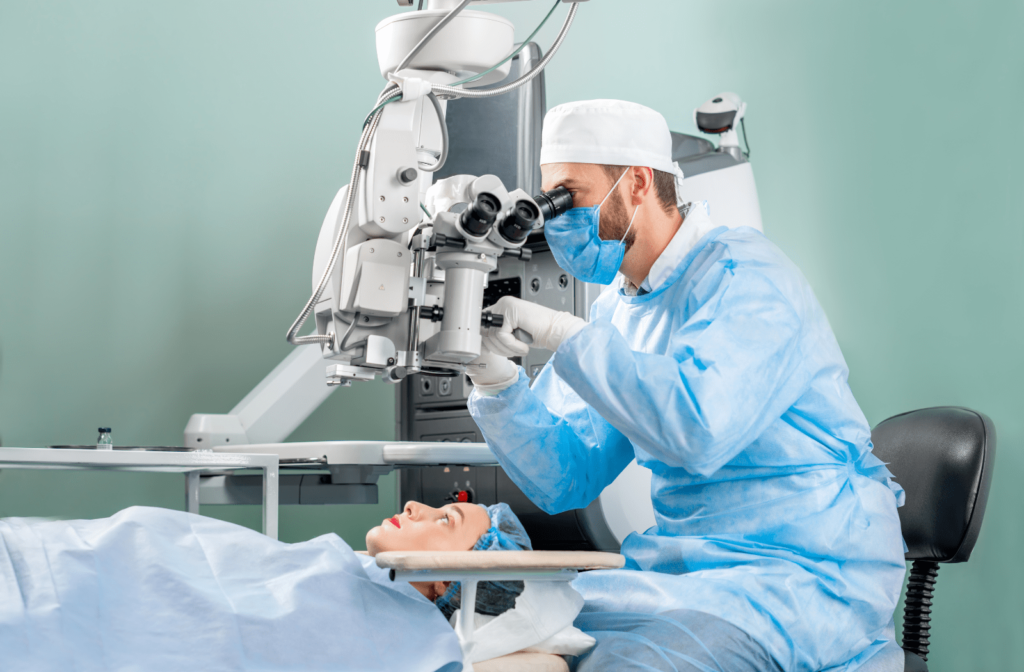When you come in for your regular eye exam, you’ll likely hear of the variety of treatment options for people with refractive errors. Whether you’re nearsighted, farsighted, or have astigmatism, inevitably the idea of laser eye surgery comes up.
Maybe you’re tired of remembering your glasses or find contact lenses uncomfortable, whatever the reason, laser eye surgery has helped many people correct their vision.
But every surgery comes with risks, and for something as delicate as our eyes the question is obvious, does it hurt? While refractive surgeries can feel uncomfortable, they don’t normally hurt.
What is Laser Eye Surgery Used For?
Refractive errors are a collection of vision disorders where the eye cannot properly focus light into the retina. This is commonly due to irregularities in the shape of the cornea, the clear front dome of your eye. Refractive surgery is a process where the cornea is permanently reshaped to better focus light.
There are a few different types of laser eye surgery offered in Canada:
LASIK
Though a more complex surgery, LASIK is the more common procedure. It is done by cutting a flap in the outer layer of the cornea and peeling it aside. A laser is then shot into the eye, trimming away a calculated amount of tissue from the cornea’s interior.
The cornea is reshaped in this way to better focus light on the retina. After the surgery is complete, the flap is replaced and allowed to heal.
Photorefractive Keratectomy (PRK)
Here the top layer of the cornea is removed using a blade or laser before fixing irregularities in the deeper tissues. This type of surgery has been around for a long time, and because it doesn’t leave a flap behind is generally regarded as safer. However, it is more invasive and tends to come with a longer recovery time as compared to LASIK.
Like LASIK, both these procedures require the removal of corneal tissue, and so may not be an option for those with a thin cornea or other eye conditions. A consultation with an eye professional is the best way to decide if either of these surgeries is right for you.

During the Surgery
Whether you end up having LASIK or PRK, much of the process remains the same.
Generally, people are kept awake during the surgery. The entire surgery usually takes about 30 minutes and begins with numbing eye drops. Once these drops take effect, you shouldn’t feel any pain. You may experience some discomfort or pressure on your eye, but this is completely normal.
We understand the process can be scary. The idea of a laser shining in your eye is a rare experience, and some people request relaxants or sedatives for the length of the procedure. However, numbing eye drops are preferred over general anesthesia due to the unnecessary risk it poses for a surgery such as this.
Post-Surgery Care
After laser eye surgery, some people may experience mild discomfort or sensitivity to light. These symptoms usually go away within a few days. Your surgeon will provide you with specific instructions on how to care for your eyes after the surgery and what to expect in terms of recovery time and potential side effects.
You should not be experiencing any severe pain during this recovery period. If you do, contact your doctor immediately.
LASIK Recovery
Many people who have LASIK surgery report an immediate improvement in their eyesight. Recovery is quicker than PRK since the incision flap can continue to protect the eye. While you may be given some medicated eye drops to take care of any irritation, you should be recovered within a few days of the procedure.
PRK Recovery
Since a layer of the cornea is fully removed, you’ll have to wear a contact lens-like bandage as your eye heals. Your vision will probably still be blurry during this time and it is suggested you don’t drive or do anything requiring precision sight.
You’ll also receive medicated eye drops and other medication to help with any discomfort. Because PRK doesn’t leave a flap, it is normally seen as safer.
Further Questions About Laser Eye Surgery
Overall, laser eye surgery is generally considered to be a safe and effective way to correct vision problems. While it might be uncomfortable, it shouldn’t hurt. However, like any surgery, there are some risks involved.
It’s important to discuss the potential risks and benefits before deciding whether laser eye surgery is right for you. The Eye Care Centre helps all sorts of people make this decision.
Whether you’re curious about laser eye surgery or looking for a referral, we have experts who can answer all your questions. Book an appointment today and learn about your options.



